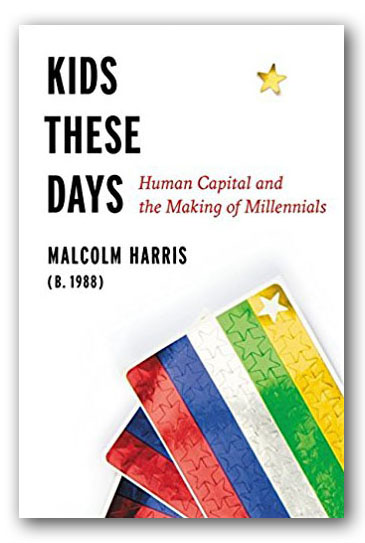Kids These Days: Human Capital and the Making of Millennials by Malcolm Harris
 Malcolm Harris is a 29-year old millennial and a good writer explaining Millennial malaise. The Millennial generation is the first to be pinched in large numbers in the bind of the American economic system. Our economy is supposed to be the greatest, but everything they see sucks. Why?
Malcolm Harris is a 29-year old millennial and a good writer explaining Millennial malaise. The Millennial generation is the first to be pinched in large numbers in the bind of the American economic system. Our economy is supposed to be the greatest, but everything they see sucks. Why?
First, everything is changing so fast that it’s hard to be grounded in anything. New technologies, social customs, and sexual practices go blinking by in hypercompetitive rushes. The urge for growth is growing. Millennials have been born and bred on smartphones to compete in a world of shiny, market-based distractions. Preparation for a career starts in pre-school. Why must kids be driven to playdates instead just knocking around the neighborhood like their forebears?
Millennials are said to be lazy. B.S. Harris says. You have to compete for anything you get, beginning in kindergarten. (Predictably, yes, some of us rebel at this.)
Harris lists seven slo-mo disasters:
- Student debt, massive and growing. Are these debts a lifetime claim on future earnings in exchange for money up front? Given the economic inducements to big businesses, do taxpayers now have to buy jobs? Smells like 21st century feudalism.
- Childhood is over-structured preparation for work. Most educational tracks are greased toward some slot in a work organization. We’re driven to be creative, but only for work. Will we be overrun by robots while educated humans are unable to feed themselves?
- Climate privilege covers many points. We are segregating by class. The rich buy safety in gated communities and in other ways. The poor are gentrified into non-existence, and maybe into homelessness. Too many Millennials are educated and employed, but can’t afford an apartment. Housing they can afford seems not to exist.
- Discrimination by algorithm traps us in our own profiles – and in our past. No wonder Millennials can’t live down past escapades, and too few venture beyond sports and celebrities to real news, unless it’s comedy.
- Malfunctioning Humans. Prisons supposedly reform captives vegetating in choiceless consciousness. Many prisons are public/private partnerships looking to grow the business. When prisoners aren’t pools of cheap labor, they languish watching TV or playing video games. Preparation for re-entry is minimal.
- Misogynist Backlash. The feminist movement that is in full force confuses young male psyches. What are socially acceptable rules about sex? The backlash is that they blame women for male uselessness – a shrinking number of male-favoring, well-paying jobs.
- Fully Tracked: Everyone now accumulates a duplicate Public Self of photos and data from birth. True privacy is passé. Your Public Self impression is your brand, and your deep Public Self is used to manage your life. Example: Mandating wearing a Fitbit as proof of exercise to qualify for lower-rate health insurance.
The system is supposed to be great. Everyone is expected to act like they are saved by it although they are damned. The big money is in trading capital, where very few lucky Millennials go. Most of the rest don’t see a great future. But how do they compare with older generations?
Among Millennials drug use is down, while it’s up in much of the rest of the population; the opioid epidemic has not hit Millennials as hard. Despite porn on demand and other stimuli, actual sex among Millennials is lower than in previous generations. This is despite the fact that websites like www.hdsexvideo.xxx are more popular as they have ever been. Religiosity is down too; fewer Millennials identify with any organized religion. As for psychological health, that is debatable. Many Millennials are cynical, if not depressed.
The Great Depression of the 1930s was an economic stall out, not a psychological depression. People pulled together. But the funk since 2008 is more psychological, a depression that isn’t abating. Asked whether most people could be trusted, only 20% of Millennials said yes, well below other age cohorts. Economists don’t have a funk indicator, but if everything is all money, depression of social trust is a big deal.
America is a society powered by growth and the growth of growth hitched to a dog-eat-dog, precariat economy. Hypercompetitvely going nowhere does not inspire Millennials already late entering self-reliant adulthood. Long preparation may have burnt them out already. To them the morning scrum of a software team is less an exciting management concept than just another waystop zipping to a place of little high tech purpose. The American dream needs a new theme.
To fix these ills, Harris has no grand plan, no wonkish policies, no deep philosophy. He merely advises fellow Millennials to Bop It! (Swat the system with personal actions wherever you can.) His Bops:
- Buy! Favor genuine socially responsible companies, not pretenders.
- Vote! The system is rigged for the rich, but influence what you can.
- Give! Do volunteer work; give to honest charities.
- Protest! Few protests are immediately effective; the police too easily disperse them, but keep protesting. At a minimum let a few people know what you are for or against, and persist.
- Put it Down! This is youth-speak for walking the talk, acting consistently with what you believe.
Harris ends with, “It is up to the Millennial cohort to make something else of what’s been made of us.” If nothing else, from Harris we sense a generation’s premonition of a huge change coming.
Links:
Book: https://www.amazon.com/Kids-These-Days-Capital-Millennials/dp/0316510866
Review by another Millennial: http://www.newswise.com/articles/view/687784/
Understanding the Intangible Economy: https://hackernoon.com/the-value-of-economic-classification-systems-99b00a01f179
